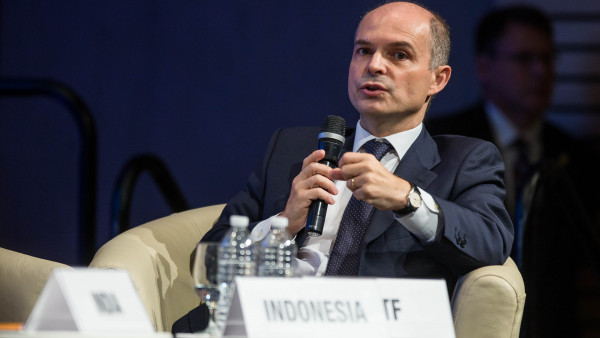Former Financial Action Task Force President Juan Manuel Vega-Serrano speaks during a panel discussion on financial inclusion at the 2016 Annual Meetings of the International Monetary Fund Headquarters and the World Bank Group on October 7, 2016 [Getty]
The international crime watchdog Financial Action Task Force (FATF) removed Turkey from its “grey list” of countries that require special scrutiny on Friday, in a boost to the country’s economic turnaround plan.
Turkey was downgraded to the “grey list” in 2021 on concerns about money laundering and terrorist financing. The latest move came after an FATF team recently held meetings with Turkish authorities to assess progress in addressing those worries.
Turkey has made “significant progress” in improving its regime of anti-money laundering and combating the financing of terrorism, the Paris-based body said in a statement after its plenary meeting in Singapore.
Turkish officials welcomed the move, which is seen as improving its international standing and potentially drawing in fresh investment.
“With this development, international investors’ confidence in our country’s financial system has become even stronger,” Turkish Vice President Cevdet Yilmaz said on the social media platform X.
“The decision will have extremely positive consequences for both our financial sector and our real sector,” he said.
There was little market reaction to the move, which was widely expected, with the lira firming slightly to 32.8845 against the dollar. Istanbul’s main share index was 0.5% higher.
“The good news around Turkey, and the reforms from (Finance Minister Mehmet) Simsek just keep on coming,” said Tim Ash, a strategist at Bluebay Asset Management.
There are some two dozen nations that are on the “grey list” and considered risky by the FATF, a body that groups countries from the United States to China to tackle financial crime. In February, it removed the United Arab Emirates from the list.
Boost to investment?
Turkey was put on the “grey list” in October 2021 for failing to supervise banking, real estate and other sectors vulnerable to money-laundering and to financing groups such as Islamic State and al Qaeda on the UN’s sanctions list.
Countries on the list undergo increased monitoring and must actively work with the FATF to correct deficiencies.
Research suggests an upgrade could lead to more foreign direct investment and Yilmaz said inflows would accelerate.
Turkey’s FDI inflows were $1.5 billion in the first quarter, down 52% from the quarterly average in the three years previous, Turkey’s International Investors Association said.
Turkey has started attracting greater investor interest after implementing an economic policy U-turn following a general election in May 2023, reversing an unorthodox low interest rates policy and raising its policy rate to 50% from 8.5%.
The previous unorthodox low rates policy had triggered a lira slide and rampant inflation, which reached 75.45% in May but is expected to begin falling in the second half to around 42% by year-end.


